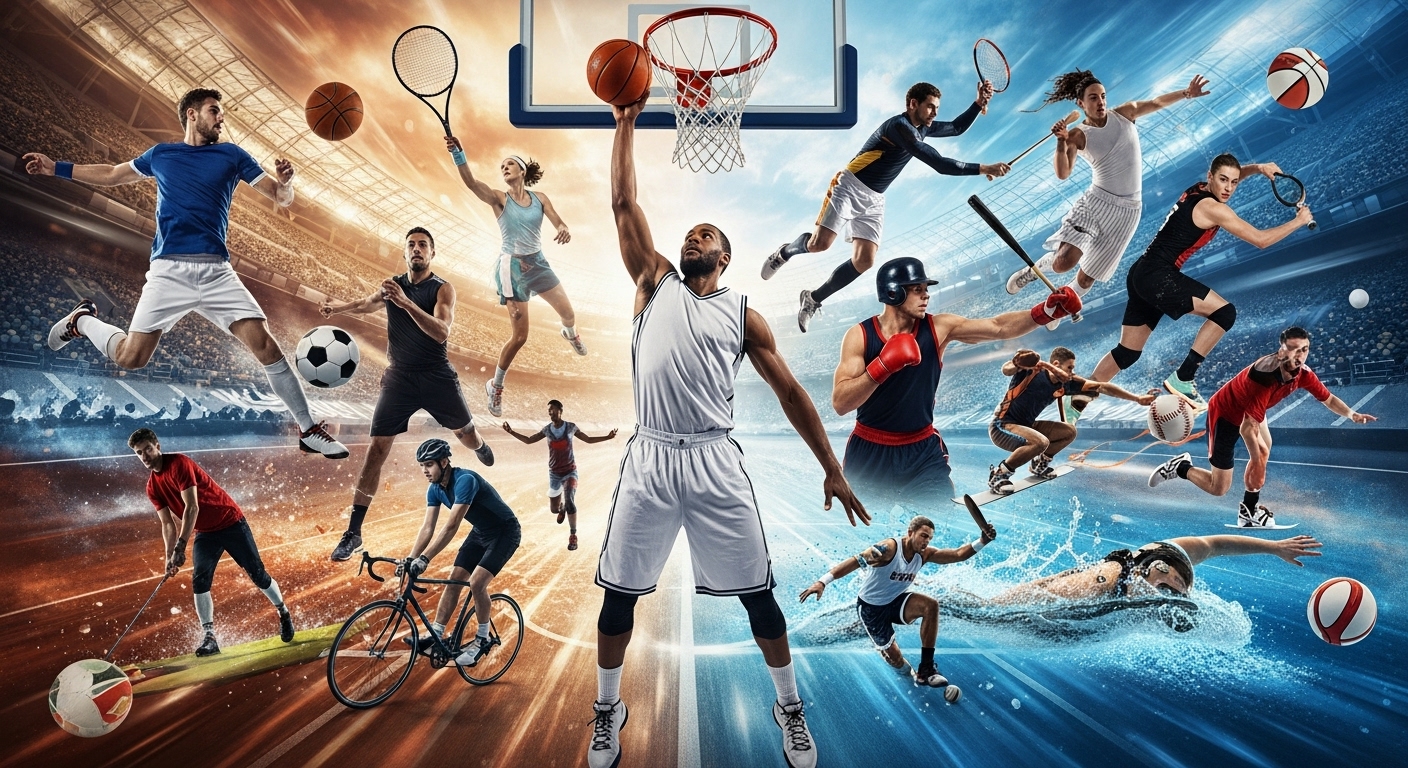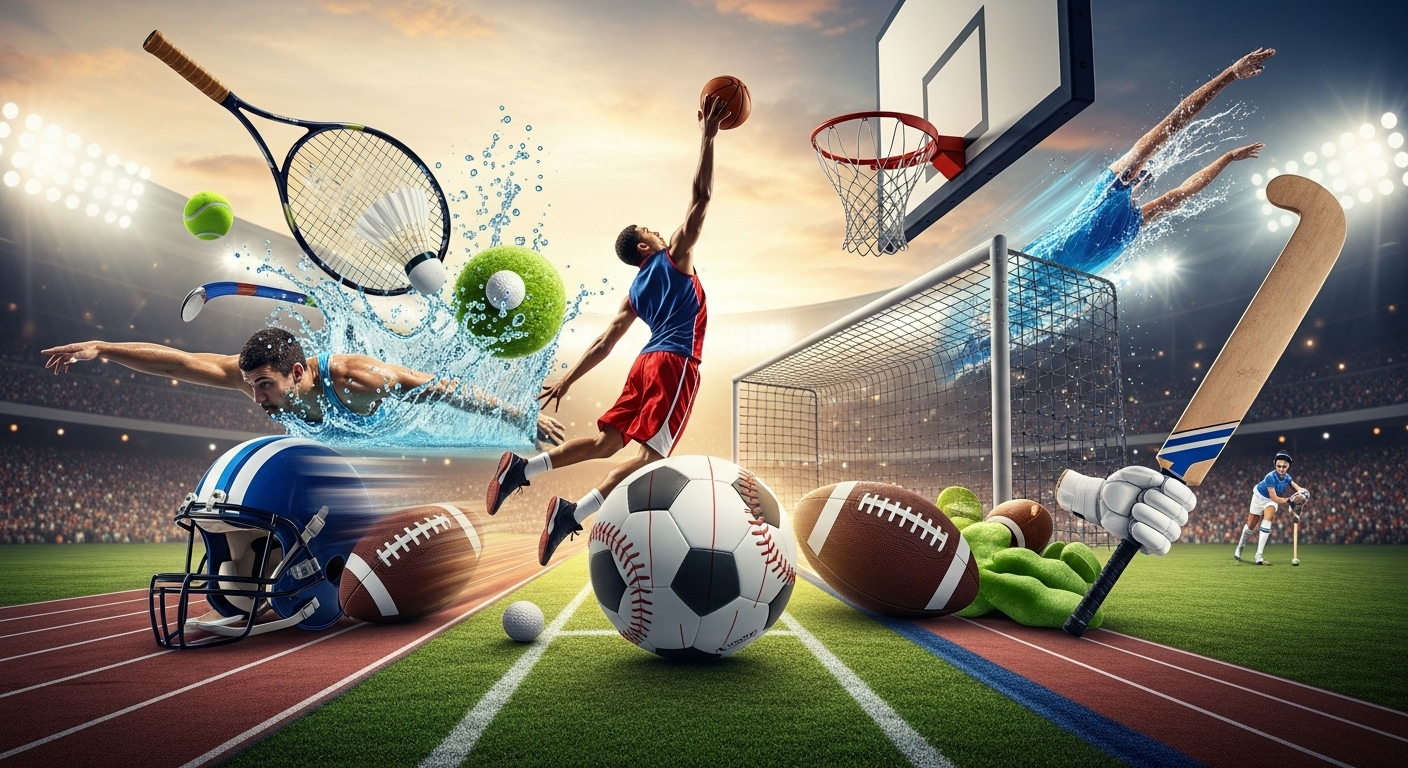Sports have a unique ability to transcend borders, cultures, and social classes. They have the power to unite people, create shared experiences, and inspire individuals to push the boundaries of human potential. Whether it’s the exhilarating feeling of scoring the game-winning goal, the discipline and rigor of training, or the camaraderie forged between teammates, sports offer much more than mere physical exercise. They shape communities, foster personal growth, and teach valuable life lessons. This blog delves deep into the multifaceted role that sports play in our lives, from their impact on physical and mental health to their role in shaping society and culture.
The Global Language of Sports
Sports are universal. Regardless of where we come from or what language we speak, the love of sports binds us together in ways few other things can. Whether it’s football in Brazil, cricket in India, basketball in the United States, or rugby in New Zealand, sports are a part of almost every culture across the globe. The ability of sports to bring people together is perhaps its most powerful feature.
For instance, global sporting events such as the FIFA World Cup or the Olympic Games act as grand celebrations of human achievement. These events unite nations, cultures, and people from different walks of life, all in the name of sport. The excitement and anticipation of such events create shared moments of joy, as millions of fans cheer for their respective teams or athletes, even when they may not speak the same language or share the same traditions.
This universal appeal of sports transcends national boundaries. It serves as a common ground for building relationships and fostering mutual respect. Through sport, individuals from all corners of the world learn the values of teamwork, fair play, and hard work. The shared passion for sports has the power to unite even the most divided communities, showing us that despite our differences, we are more alike than we think.
The Physical Benefits of Sports
The most obvious benefit of engaging in sports is the positive impact on physical health. Sports encourage an active lifestyle, which has countless benefits for the body. Regular participation in physical activities such as running, swimming, basketball, or tennis helps to improve cardiovascular health, boost the immune system, and enhance overall fitness. Sports can help individuals maintain a healthy weight, strengthen bones and muscles, and reduce the risk of chronic diseases such as diabetes, heart disease, and certain types of cancer.
In addition to these health benefits, sports help to improve flexibility, coordination, and endurance. Athletes regularly push their bodies to the limits, testing their physical boundaries and building strength and resilience. For individuals who are not professional athletes, recreational sports still provide opportunities to engage in physical activity in a fun and social environment. Whether it’s a friendly game of soccer with friends or a local marathon, sports offer a healthy and enjoyable way to stay active.
The physical benefits of sports also extend to mental health. Research has consistently shown that regular physical activity helps reduce stress, anxiety, and depression. Exercise, especially in the form of sport, triggers the release of endorphins—chemicals in the brain that promote feelings of happiness and well-being. Furthermore, the sense of accomplishment from mastering a skill, achieving a personal best, or simply participating in a game provides a significant boost to one’s self-esteem and confidence.
The Mental and Emotional Impact of Sports
While the physical benefits of sports are widely recognized, the psychological and emotional benefits are just as significant. Sports provide an outlet for stress and a means of mental relaxation. The focus required during competition or training helps individuals shift their attention away from daily worries and engage fully in the present moment. This phenomenon, known as “flow,” is a state in which individuals are so absorbed in an activity that they lose track of time and experience intense satisfaction.
The mental discipline involved in sports also teaches valuable life skills such as perseverance, resilience, and the ability to cope with failure. Athletes regularly face setbacks—whether it’s losing a game, dealing with an injury, or failing to meet a performance goal. Yet, it is through these challenges that athletes grow stronger. The ability to overcome adversity and stay committed to improvement is one of the most important life lessons that sports impart.
Moreover, sports teach individuals how to set goals and work systematically toward achieving them. The process of training, setting benchmarks, and tracking progress is a powerful tool for personal development. Athletes learn to manage their time effectively, balance different aspects of their lives, and stay focused on long-term objectives. These mental skills translate to other areas of life, from academics to careers to relationships.
The Role of Sportsmanship and Fair Play
One of the core values of sports is sportsmanship—the demonstration of respect for opponents, teammates, officials, and the rules of the game. Sportsmanship embodies fairness, humility, and integrity. A true athlete understands that winning is not everything and that how one plays the game is just as important as the result.
Good sportsmanship involves not only respecting the rules of the game but also showing kindness and respect to others. This includes acknowledging the skill of your opponents, accepting the outcome of a competition with grace, and offering support to teammates, whether they win or lose. These values are instilled in athletes from a young age, and they play a crucial role in building character and leadership skills.
Moreover, sportsmanship extends beyond just the athletes themselves. Coaches, referees, and fans all play an integral role in fostering an environment of respect and fairness. Coaches are not only responsible for guiding their teams in strategy and performance but also in instilling the values of teamwork, discipline, and sportsmanship. Fans, too, can contribute to a positive sporting atmosphere by showing support and respect for all participants, regardless of the outcome.
Unfortunately, in some cases, sportsmanship is overshadowed by the intense desire to win at all costs. The pressure to perform and the high stakes involved in professional sports sometimes lead to unethical behavior such as cheating, doping, and unsportsmanlike conduct. However, it is important to remember that true success in sports comes not just from victories but from the journey itself—the hard work, the perseverance, and the respect for the game.
Building Communities Through Sports
Sports have an immense capacity to build communities, both at the local and global levels. On a community level, local sports teams and events create a sense of pride and unity among residents. These teams become a source of collective identity, where fans and players alike rally around the team’s success. Whether it’s a small town’s high school football team or a city’s professional basketball club, sports help to create bonds between people who may otherwise have never interacted.
The sense of community forged through sports extends beyond the game itself. It brings people together to celebrate victories, commiserate losses, and share in the highs and lows of the sporting journey. Sports clubs and organizations often provide opportunities for socializing, volunteering, and building lasting friendships. They act as social hubs where people from different backgrounds can come together over a common passion, making the community stronger and more connected.
Sports can also play a significant role in fostering social change. For example, programs that use sports to teach life skills, promote health, and address social issues have become increasingly popular. Many grassroots organizations use sports as a tool to engage young people in disadvantaged communities, providing them with structure, discipline, and a sense of purpose. These programs offer young people positive role models and teach them the value of hard work, respect, and teamwork. By using sports as a vehicle for personal growth, these initiatives are making a real difference in the lives of countless individuals.
The Evolution of Sports: From Amateur to Professional
The history of sports is rich and varied, with different cultures contributing to the development of games and competitions. In ancient civilizations, sports were often religious or military in nature, with events such as the ancient Olympic Games in Greece serving as a tribute to the gods. Over the centuries, sports evolved, and as societies advanced, so did the complexity and structure of sporting events.
In the modern era, sports have become highly professionalized, with athletes now competing for vast sums of money and fame. Professional sports leagues such as the National Football League (NFL), National Basketball Association (NBA), and Major League Baseball (MLB) have become multi-billion-dollar industries. The commercialization of sports has led to the creation of high-paying jobs for athletes, coaches, and various professionals involved in the industry.
While the rise of professional sports has made many athletes household names, it has also raised concerns about the pressures placed on players. The emphasis on winning, the intense media scrutiny, and the financial stakes can sometimes lead to unhealthy practices, such as doping, overtraining, and mental burnout. The increasing commercialization of sports has sparked debates about the balance between entertainment and the true spirit of competition.
At the same time, technology and innovation are reshaping the future of sports. The introduction of data analytics, performance-tracking devices, and virtual reality is changing how athletes train and compete. These advancements are pushing the boundaries of human performance, enabling athletes to achieve feats that were once thought impossible.
The Future of Sports: Technology and Innovation
The future of sports promises to be exciting and transformative, largely due to advancements in technology. In recent years, we have seen how technology is enhancing the fan experience and revolutionizing the way sports are played. Virtual reality (VR) and augmented reality (AR) are becoming increasingly popular in training athletes and engaging fans. VR allows athletes to practice in simulated environments, improving their skills and preparing for real-world competition. Fans, on the other hand, can experience games in immersive ways, such as by viewing matches from multiple angles or interacting with live statistics in real-time.
Wearable technology is also playing a huge role in sports. Devices such as heart rate monitors, GPS trackers, and smartwatches are providing athletes with detailed insights into their performance and physical condition. These devices allow athletes to optimize their training, prevent injuries, and monitor recovery. Coaches and analysts also rely on big data to make strategic decisions, using algorithms to analyze player statistics, match performance, and team dynamics.
As sports continue to evolve, we can expect even more exciting innovations that will shape the future of competition, fan engagement, and athlete development.
Conclusion
Sports are far more than just games played for entertainment. They are an essential part of human culture and society, offering a wide range of physical, mental, and emotional benefits. Sports promote physical health, enhance mental well-being, and teach valuable life lessons about discipline, resilience, and teamwork. They create communities, foster friendships, and inspire individuals to strive for excellence. Whether through local leagues, international tournaments, or the simple joy of playing with friends, sports have a transformative power that enriches our lives in countless ways.
In the end, sports remind us of the importance of striving to be our best, overcoming obstacles, and respecting others—values that transcend the game itself and apply to every aspect of life.




